Cables here, cables there, cables everywhere! If you dread
walking into your server room to troubleshoot a network issue because of bad
cable management or worse, dread having to give higher-ups a tour of your
facilities, then it’s about time to straighten up your cable management system.
Before we discuss solutions to help you get more organized,
let’s look at some examples of horrible cable management. Be warned: some of
these examples may just make you cry; we know we did.
Let’s play a game, can you find the hidden
equipment in this mess?
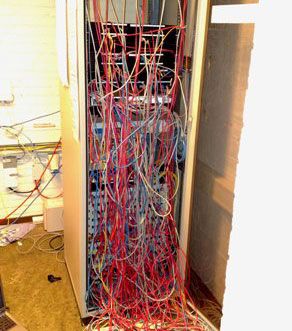
Image source: Vibrant.com
Just looking at this green mess is bringing out
Hulk-like feelings.
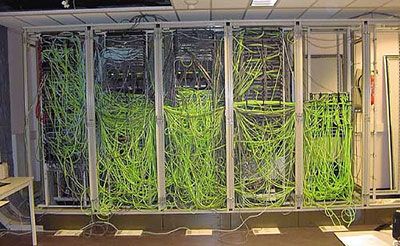
Source: Techeblog
Not sure why, but this one has us craving pasta.
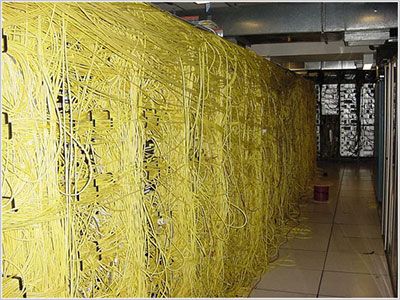
Image source: Royal
Pingdom
Try walking down this without crying, we dare
you.
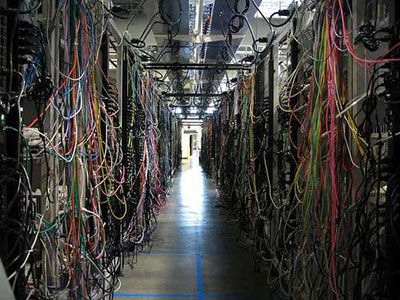
Image source: Vibrant.com
You could say this guy is really buried in his
work.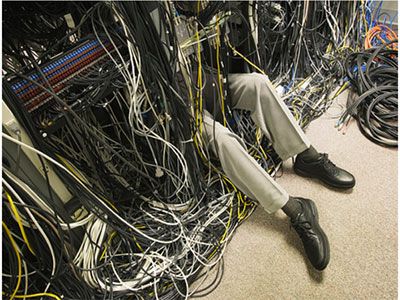
Image
source: TechRepublic
Now that we have looked at some terrible examples of cable
management, here are some things you can do now to avoid joining the terrible
cable management hall of fame photos we just shared.
Proper cable management will not
only support existing infrastructure, but will also allow for future growth.
- Before
purchasing or installing cable products, determine the amount of cabling and
connections required. Be sure to allow room for access and growth.
- Be
sure to follow industry standards, such as ANSI/TIA and ISO/IEC, as well as any
federal, state or local regulations. This will help ensure a safe, failure-free
installation that will minimize system downtime.
- Plan
for change by organizing cable properly and labeling cable that may need to be
quickly and easily identified. Also, try to avoid blocking access to equipment
inside and outside the racks.
- Be
sure to use sweeping 90-degree bends when transitioning from the pathway
support to the racks.
- Density
is very important in data center cabinets and racks, so keep in mind how many
rack spaces are being utilized with horizontal wire managers.
- Select
a vertical cable manager that can accommodate all of the cable feeding from the
horizontal managers. Use waterfalls and spools to help manage multiple cables
and to help with maintaining proper bend radius on copper and fiber cables.
Also, Velcro cable supports are reusable and a safe way to secure the cable
without damaging it.
- Do
not overfill your managers, which can cause kinks and make moves, adds and
changes difficult. CPI recommends using a 50% cable fill when selecting
vertical and horizontal cable management. This allows sufficient space for
maintaining cable bend radius for patch cords.
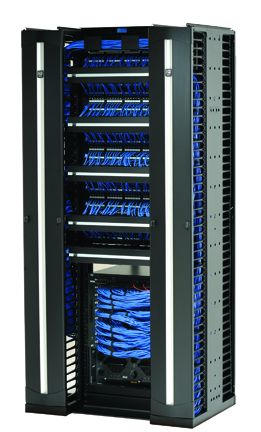 CPI offers both vertical
and horizontal
cable management solutions. If you are upgrading your
current infrastructure or designing a new installation, you can trust the
experts at CPI to deliver the most comprehensive line of cable management products in the industry.
CPI offers both vertical
and horizontal
cable management solutions. If you are upgrading your
current infrastructure or designing a new installation, you can trust the
experts at CPI to deliver the most comprehensive line of cable management products in the industry.
Our cable management manages and maintains the cables and cords that provide the
critical support, reliability and flexibility needed to sustain and grow your
network capabilities.
:
- Streamline the management of your cables and cords to optimize
the signal quality and network speed of your information exchange.
- Organize cables so that they can be easily traced from start to
finish when performing moves, adds and changes, saving you valuable time and
money.
- Fulfill high-density cabling requirements while maintaining
proper bend radius and slack management for maximum network performance.
For more details on CPI’s Cable Management products and
services, be sure to view our line of Cable Management products. To read more about CPI’s Cable Management solutions in
the real world, be sure to check out our case studies from Lucent
Technologies, Pacific
Sun and Sun
Microsystems.
CJ Castillo, Technology Writer